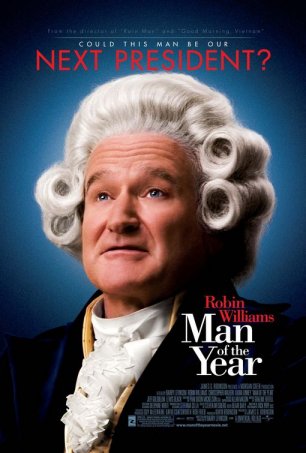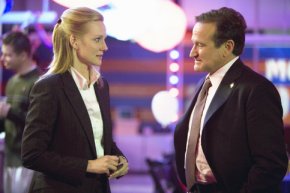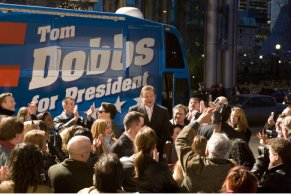|
Man
of the Year
Man of the Year
isn't funny; it's angry. Writer/Director Barry Levinson
has seen a system corrupted, if not outright broken, and
he's not going to take it anymore. Unfortunately, it's not
the kind of anger that stirs people up. Consider this, as
Woody Allen once scripted, a devastating letter to the New
York Times.
Ads make it out to be a feel-good comedic
fantasy about a political comedian winning the Presidential
election. Sure, that's a wish fulfillment for those that
consider Jon Stewart the sharpest political mind in the
country. Though Levinson has built this vehicle around Robin
Williams, the film actually intends to be a political thriller/satire
that happens to be about funny people, instead of being
actually funny.
Even the manic Williams does his own material
at half-speed, which doesn't blunt the edge of his observations,
but definitely dulls the delivery. Part of that comes from
his character Tom Dobbs' initial conviction that if he's
going to run for President, he's going to talk seriously
about the issues for once.
Though that drives his staff crazy, begging
him to cut loose with his cutting wit, none of it really
matters. It's all just set-up for the real plot. For the
first time, the entire nation will be using the same computerized
voting machines, and software programmer Eleanor Green (Laura
Linney) has discovered a flaw that consistently gives the
election to the wrong candidate.
Naturally, this means that Eleanor's life,
or at least her reputation, are in danger. It's too close
to the election to admit that the machines don't work correctly.
Cue ominous music and a woman on the run, especially once
the machines inexplicably elect Tom Dobbs.
To top off the roller coaster tone, Green
and Dobbs find themselves attracted to each other, so in
between scenes of suspenseful stalking by her former employers,
we get gentle romantic comedy. When Robin Williams does
gentle romantic comedy, he can't help but be cloying.
And cloying just doesn't work when you've
got sinister lawyers (Jeff Goldblum), break-ins, druggings
and mysterious "car accidents" that aren't played the slightest
bit for laughs. Shamefully, Levinson even puts Dobbs on
Saturday Night Live and forces Tina Fey to do an
irony-free moral moment. Not only is it one of an endless
parade of pundit appearances to add verisimilitude, Fey
just doesn't do irony-free.
Throughout the film, Levinson keeps playing
against his actors' strong points. He puts Christopher Walken,
as Dobbs' manager, in a wheelchair, sharply reducing his
quirky physicality. As a plot point, it serves little purpose
beyond an opening scene red herring. Though Goldblum can
do evil really well, Levinson actually writes the character
as little more than misguided. It's a disservice to both
the actor and the plot.
Aside from Williams forced into a Jon Stewart
suit, the biggest waste of talent is in Lewis Black. One
of the best (and funniest) ranters alive, Black plays Dobbs'
head writer Eddie Langston, and ends up whining more than
releasing comedic vitriol. Levinson uses Black to harp on
the movie's themes, but doesn't allow the ideas to be expressed
with any wit; it's just repetitive and ham-handed.
Black's presence also triggers an area
of unbelievability. In a world that acknowledges The
Daily Show, it's difficult to swallow the idea that
a writer for a rival program could look and sound like Lewis
Black (shot to prominence by his appearances on The Daily
Show) and not have someone comment on it.
Then again, all Black and Eddie Langston
really have in common is Levinson's anger. It's a righteous
anger smothered by a possible fear of being too on the nose.
Everything gets softened. The voting machine scandal really
is just an accident, not a conspiracy as some believe happened
with Diebold's machines in real life. The rival presidential
candidates are bland but decent, and despite Dobbs' antipathy
for them, we have no reason to think they aren't
trying to be good leaders.
So
Man of the Year should inspire the same kind of soft
anger, at a movie that has a good idea at its core, good
talent and good timing but still can't pull itself to its
feet.
A talented
filmmaker like Barry Levinson should be better at picking
which tools he's going to use to make such a personal and
important statement. Working with Williams should have knocked
this out of the park; Levinson was one of the first directors
to figure out how to use Williams correctly in film with
Good Morning, Vietnam.
We should be angry
at exactly the same things Levinson is, but we should also
be angry that we didn't get a film that effectively explained
why nor even turned out particularly entertaining.
Rating:

|








